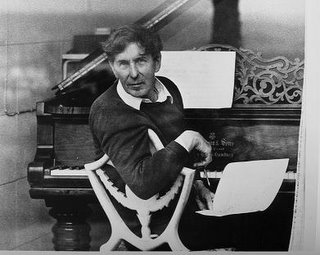 Programming is likely made easier this year, considering all the milestones and birthdays that occur during the 2005-06 concert season. The obvious instance, which no orchestra or opera company on the planet has missed, is the 250th anniversary of the birth of Mozart. Other anniversaries abound as well, including the 500th birthday of Thomas Tallis and the 80th birthday of Gunther Schuller (stay tuned for future Ionarts reports), the 100th anniversary of the premiere of the Sibelius Violin Concerto in d minor, which will be part of an upcoming NSO program, (a performance of which by the Boston Symphony with Julia Fischer would have been reviewed by Ionarts, had my car’s transmission not blown en route), the 100th anniversary of the birth of Harold Arlen (look for the Baltimore Symphony’s program in December), as well as the 100th birthday of the late Sir Michael Tippett.
Programming is likely made easier this year, considering all the milestones and birthdays that occur during the 2005-06 concert season. The obvious instance, which no orchestra or opera company on the planet has missed, is the 250th anniversary of the birth of Mozart. Other anniversaries abound as well, including the 500th birthday of Thomas Tallis and the 80th birthday of Gunther Schuller (stay tuned for future Ionarts reports), the 100th anniversary of the premiere of the Sibelius Violin Concerto in d minor, which will be part of an upcoming NSO program, (a performance of which by the Boston Symphony with Julia Fischer would have been reviewed by Ionarts, had my car’s transmission not blown en route), the 100th anniversary of the birth of Harold Arlen (look for the Baltimore Symphony’s program in December), as well as the 100th birthday of the late Sir Michael Tippett.The latter was revered by the Boston Symphony under the baton of Sir Colin Davies this weekend. A Child of Our Time -- Tippett’s most performed work -- an “oratorio” for full orchestra, chorus (in this case, the Tanglewood Festival Chorus), and soloists, was performed along with Mozart’s “Posthorn” Serenade No. 9 in D.
 Davies has a storied history with the BSO and Tanglewood, as well as with Tippett’s music. This performance marks the first time that the BSO has done the work since Davies introduced it to the Boston audience over 25 years ago. The piece itself is hard to accept as a whole. There is very little continuity, or dramatic interest, in the text alone (a Kristallnacht account written by Tippett with a heavily personal, Jungian slant), or the musical framework, which intermingles 20th-century tonality interspersed with African-American spirituals (what the agnostic Tippett considered a “musical metaphor” for religious emotion), and one tango, for reasons that are beyond explanation. It seems that the piece came at a time when the wartime musical community of England was in need of an emotional catharsis, and Tippett fit the bill, while, in the same vein, trying to work out his own neuroses.
Davies has a storied history with the BSO and Tanglewood, as well as with Tippett’s music. This performance marks the first time that the BSO has done the work since Davies introduced it to the Boston audience over 25 years ago. The piece itself is hard to accept as a whole. There is very little continuity, or dramatic interest, in the text alone (a Kristallnacht account written by Tippett with a heavily personal, Jungian slant), or the musical framework, which intermingles 20th-century tonality interspersed with African-American spirituals (what the agnostic Tippett considered a “musical metaphor” for religious emotion), and one tango, for reasons that are beyond explanation. It seems that the piece came at a time when the wartime musical community of England was in need of an emotional catharsis, and Tippett fit the bill, while, in the same vein, trying to work out his own neuroses.Tippett...Tippett Good (May 7, 2005) A Child of Our Time? (May 12, 2005) Richard Dyer, Davis reunites with BSO for memorable 'Time' (Boston Globe, October 29) Keith Powers, Kristallnact a `Time' for spirituals (Boston Herald, October 28) Steve Smith, Of Our Time (Night After Night, October 30) |
The writing in this program prominently featured the BSO’s winds, whose fluid technique and intonation were a warm indication of the power of the sections other than the formidable strings. Additional recognition must go to Charles Schlueter, the BSO’s Principal Trumpet, who sat patiently for over 30 minutes before playing 4 minutes of solo posthorn in the Mozart, an instrument (literally the one that they would play when the mail came) whose intonation seemed to require a great deal of effort.
they misspelled "Kristallnacht" at the boston herald? that's pathetic.
ReplyDeleteJens,
ReplyDeleteI thought about correcting it when I was adding those links, but where would the fun be in that?
Well, I, for one, would have had less fun.
ReplyDelete